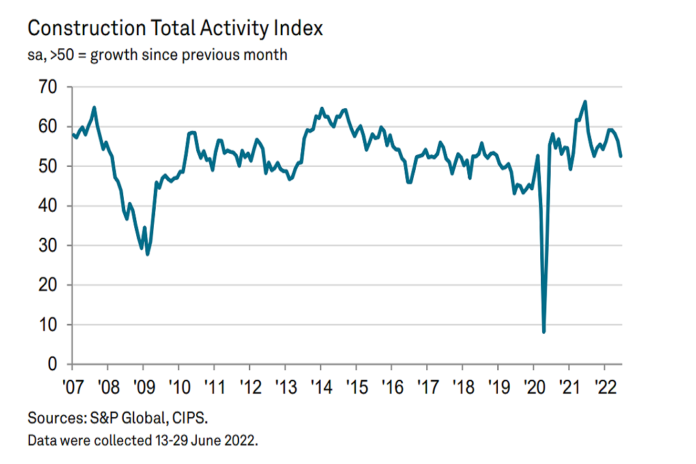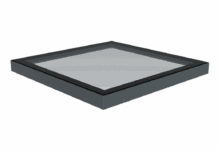UK construction companies signalled another loss of momentum in June as total business activity expanded at the weakest pace for nine months.
New orders increased to the smallest extent since last October, with worries about the near-term economic outlook leading to a sharp decline in business expectations for the year ahead.
June data indicated that growth projections are now the least upbeat since July 2020. At 52.6 in June, down from 56.4 in May, the headline seasonally adjusted S&P Global / CIPS UK Construction Purchasing Managers’ Index (PMI) registered above the 50.0 no-change mark for the 17th consecutive month.
However, the latest reading signalled only a moderate increase in construction output and the slowest rate of expansion since September 2021.
Civil engineering
Civil engineering was the most resilient sub-sector in June (index at 54.3, down only slightly from 55.5 in May). A similarly strong increase in business activity was seen in the commercial segment, but the rate of growth eased sharply since May to the slowest so far in 2022 (index at 54.3, down from 59.8).
House building
However, house building was the weakest-performing area of construction activity for the fourth month running in June. Moreover, the latest index reading of 49.3 signalled an overall downturn in residential work for the first time since May 2020.
Work force issues
The June data pointed to a solid rise in total new orders, but the rate of expansion softened to its weakest since October 2021. Some construction companies noted a lack of new work to replace completed projects due to economic uncertainty and inflation concerns.
What’s more, survey respondents commented on shortages of candidates to fill vacancies, despite higher wage offers. Input buying meanwhile increased at a much slower pace than in May, with the latest expansion the weakest since the start of 2021.
Delivery times
Suppliers’ delivery times lengthened again in June, but the downturn in performance remained less marked than that seen in the first quarter of 2022. Staff shortages and a lack of transport availability were the most commonly cited reasons for longer wait times for construction products and materials.
Costs
Around 71% of the survey panel reported higher purchasing prices in June, while only 1% signalled a reduction. The resulting index signalled a rapid pace of cost inflation that was slightly faster than in May, albeit still below the survey record high seen in June 2021. Higher prices paid mostly reflected rising energy, fuel and transportation costs, according to survey respondents.
Looking ahead, around 36% of construction companies anticipate a rise in business activity, compared to 17% that expect a decline. While this highlighted positive sentiment overall in June, the degree of optimism signalled was the lowest since July 2020.
Weaker business confidence has now been recorded for five months running, largely reflecting subject growth expectations for the UK economy, alongside uncertainty about the impact of higher interest rates and escalating inflationary pressures.
The impact of the war
Joe Sullivan, partner at MHA, believes the full inflationary effects of the war have now worked their way through the system. He explained: “In recent months we had seen material prices start to level off, but we’re now seeing the full effects of the war in Ukraine work their way through the system, driving up prices and ensuring we continue at these price levels for some time.
“Although the war began on 24 February, it takes time for the range of effects to work their way through. Together with these input cost increases, further shortages of raw materials like timber and manufactured goods such as generator components are behind the growing number of insolvencies in the construction sector.
“The remarkable success of the residential property market continues but the rate of price increases is now slowing.
“However, the restriction in the supply of new plots is the key factor which will guard against the house ‘price bubble’ bursting significantly. This makes the sub-sector a better investment bet than most others for the year to come.
“Vendors are trying to pre-empt a recession by becoming more reasonable in the prices they seek, trying to tie up a deal quickly rather than holding out for higher prices.”
>>Read more about trends in the industry here.




